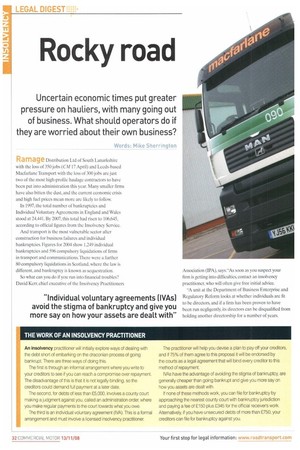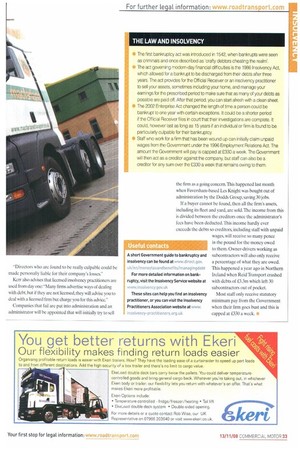Rocky road
Page 32

Page 33

If you've noticed an error in this article please click here to report it so we can fix it.
Uncertain economic times put greater pressure on hauliers, with many going out of business. What should operators do if they are worried about their own business?
Words: Mike Sherrington
. Distribution Ltd of South Lanarkshire with the loss of 350 jobs (CM 17 April) and Leeds-based Macfarlane Transport with the loss of 300 jobs are just two of the most high-profile haulage contractors to have been put into administration this year. Many smaller firms have also bitten the dust, and the current economic crisis and high fuel prices mean more are likely to follow.
In 1997, the total number of bankruptcies and Individual Voluntary Agreements in England and Wales stood at 24,441. By 2007, this total had risen to 106,645, according to official figures from the Insolvency Service.
And transport is the most vulnerable sector after construction for business failures and individual bankruptcies. Figures for 2004 show 1.249 individual bankruptcies and 596 compulsory liquidations of firms in transport and communications, There were a further 80 compulsory liquidations in Scotland, where the law is different, and bankruptcy is known as sequestration.
So what can you do if you run into financial troubles? David Kerr, chief executive of the Insolvency Practitioners Association (IPA),says: "As soon as you suspect your firm is getting into difficulties, contact an insolvency practitioner, who will often give free initial advice.
"A unit at the Department of Business Enterprise and Regulatory Reform looks at whether individuals are fit to he directors, and if a firm has been proven to have been run negligently, its directors can be disqualified from holding another directorship for a number of years. "Directors who are found to be really culpable could be made personally liable for their company's losses."
Kerr also advises that licensed insolvency practitioners are used from day one: "Many firms advertise ways of dealing with debt, but if they are not licensed, they will advise you to deal with a licensed firm but charge you for this advice."
Companies that fall are put into administration and an administrator will be appointed that will initially try to sell i the firm as a going concern. This happened last month when Faversham-based Les Knight was bought out of administration by the Dodds Group, saving 30 jobs.
If a buyer cannot be found, then all the firm's assets, including its fleet and yard, are sold. The income from this is divided between the creditors once the administrator's fees have been deducted. This income hardly ever exceeds the debts so creditors, including staff with unpaid wages, will receive so many pence in the pound for the money owed to them. Owner-drivers working as subcontractors will also only receive a percentage of what they are owed. This happened a year ago in Northern Ireland when Reid Transport crashed with debts of £3.3m which left 30 subcontractors out of pocket.
Most staff only receive statutory minimum pay from the Government when their firm goes bust and this is capped at £330 a week.












































































































































































